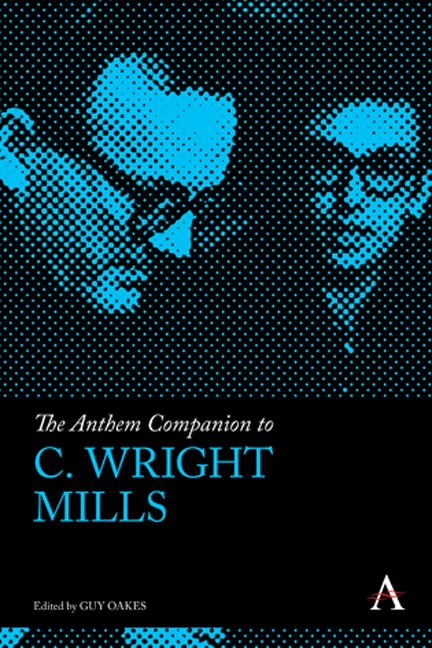Book contents
- Frontmatter
- Contents
- List of Tables
- Acknowledgments
- Introduction American Faust
- Chapter 1 C. Wright Mills on Law and Society: Hidden in Plain Sight?
- Chapter 2 Mills on the Economics of the Old Middle Class
- Chapter 3 Revisiting C. Wright Mills on the Militarization of Postwar American Society
- Chapter 4 A Critical Assessment of the Historical and Economic Underpinnings of C. Wright Mills's The Power Elite
- Chapter 5 Mills as Ethical Theorist: The Military Metaphysics and the Higher Immorality
- Chapter 6 C. Wright Mills and Latin America
- Chapter 7 For a Feminist Sociological Imagination: A Personal Retrospective on C. Wright Mills
- Chapter 8 The Sociological Imagination: A Reductionist Reading
- Chapter 9 Recent Changes in the Shape of Power
- Afterword. Mills as Classic?
- Contributors
- Index
Chapter 3 - Revisiting C. Wright Mills on the Militarization of Postwar American Society
Published online by Cambridge University Press: 17 June 2017
- Frontmatter
- Contents
- List of Tables
- Acknowledgments
- Introduction American Faust
- Chapter 1 C. Wright Mills on Law and Society: Hidden in Plain Sight?
- Chapter 2 Mills on the Economics of the Old Middle Class
- Chapter 3 Revisiting C. Wright Mills on the Militarization of Postwar American Society
- Chapter 4 A Critical Assessment of the Historical and Economic Underpinnings of C. Wright Mills's The Power Elite
- Chapter 5 Mills as Ethical Theorist: The Military Metaphysics and the Higher Immorality
- Chapter 6 C. Wright Mills and Latin America
- Chapter 7 For a Feminist Sociological Imagination: A Personal Retrospective on C. Wright Mills
- Chapter 8 The Sociological Imagination: A Reductionist Reading
- Chapter 9 Recent Changes in the Shape of Power
- Afterword. Mills as Classic?
- Contributors
- Index
Summary
Introduction
This chapter revisits one of C. Wright Mills's important contributions to post–World War II political sociology: his theory about the militarization of American society during the early Cold War. In a 1958 essay that became The Causes of World War Three, a short book aimed at a popular audience, Mills applied his conception of the postwar American state, its politics and the early Cold War to opine on what would be proximate causes for a third world war with the Soviet Union (Mills 1958b, 448). The views he expressed in Causes on American society and its political and corporate elites recapitulate ideas found in his earlier, more celebrated book The Power Elite(Mills 1956). I begin with The Causes of World War Three because that work is emblematic of Mills's postwar scholarly ambitions. In fewer than 190 pages, Mills covers enormous territory in the humanities and the social sciences – history, sociology, international politics, grand strategy, institutional military politics and domestic politics – and comments on human nature in each area. Reading his vast sweep of all matters related to the early Cold War and the march to World War III, one must consider how self-contradictory his arguments are as well as how many of his ideas makes sense. The muddle that is The Causes of World War Three is a crucial example of the writings of the postwar C. Wright Mills. Mills was very bright, he was profoundly ambitious and he wanted simultaneously to be a “public intellectual” and to be taken seriously as a sociologist of the highest order (Geary 2009). Mills's effort to succeed in the milieu of Dwight Macdonald's salon and in the professional academic world of Robert Merton and Talcott Parsons resulted in a body of work (1945–62) akin to sophisticated journalism, that is, in essays and books filled with interesting opinions but wanting in systematic analysis and primary research. This is in stark relief to the work Mills did when he began his studies, work that by any measure was of the highest order and, given his age at the time, a sign of innate intelligence and a capacious mind (Mills 1940).
- Type
- Chapter
- Information
- The Anthem Companion to C. Wright Mills , pp. 63 - 82Publisher: Anthem PressPrint publication year: 2016



